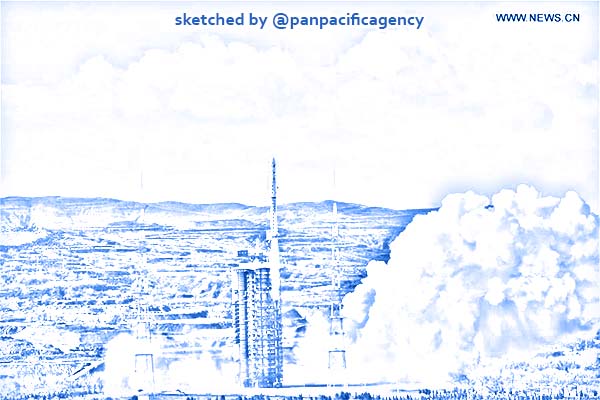[Analytics] China boosts its soft power in Africa while launching African space ambitions

A new Earth observation satellite, Gaofen-7, is launched on a Long March-4B rocket from the Taiyuan Satellite Launch Center in north China's Shanxi Province, Nov. 3, 2019. The Gaofen-7, China's first civil-use optical transmission three-dimensional surveying and mapping satellite that reaches the sub-meter level, will play an important role in land surveying and mapping, urban and rural construction and statistical investigation, according to the China National Space Administration (CNSA). (Photo by Lu Xing/Xinhua). Sketched by the Pan Pacific Agency.
Satellite technology deemed crucial to China-Africa relations but not a priority for the US in its relationship with the continent. The African space industry is estimated to be worth US$7 billion and projected to rise to US$10 billion in the next five years. Jevans Nyabiage specially for the South China Morning Post.
Providing financial support for African nations’ space programmes is helping China to advance its soft power on the continent, experts say.
Temidayo Oniosun, a Nigerian space scientist and managing director of industry news website Space in Africa, said: “China often comes to the aid of countries and provides loans for them to acquire satellites.”
China’s model is different from that of Russia – which is also a big player in Africa’s burgeoning space market – where African governments fund the Russian projects from domestic sources.
For instance, when Ethiopia launched its first satellite from a Chinese space station in December last year, Beijing is reported to have covered US$6 million of the US$8 million cost.
The probe will be used for weather forecasting, and monitoring the environment and crops.
China will help Ethiopia launch a second, remote-sensing, satellite on December 20. According to the Ethiopian Space Science and Technology Institute, the probe will be launched from China’s Taiyuan launch centre in central China’s Shanxi province.
The satellite was designed by Ethiopian and Chinese engineers at Smart Satellite Technology Corp in Beijing and jointly funded by the two countries.
The project is consistent with Beijing’s growing ambitions in space and its agenda to become the world’s leading space power in the next quarter of a century.
Beijing has launched an increasing number of rockets and also deployed more payloads – satellites, space probes and manned or unmanned spacecraft – in recent years. In 2019, it launched 32 rockets into space, more than any other country that year.
In May, Beijing successfully launched the Long March-5B rocket after failed attempts to launch Long March-3B in April and Long March-7A in March.
According to the ChinaPower project of the Centre for Strategic and International Studies think tank in Washington, of the 2,666 satellites known to have been in orbit as of March, 363 were owned or operated by Chinese entities.
Russia had 169 satellites in operation and the United States 1,327, it said.
Among the Chinese probes in space is the BeiDou navigation satellite system – an alternative to America’s GPS, Russia’s Glonass and Europe’s Galileo systems.
Space in Africa said the African space industry was worth about US$7 billion and is projected to rise to US$10 billion in the next five years.
The African Union passed legislation in 2017 that established the African Space Agency, headquartered in Egypt, and many countries, including South Africa, Sudan, Egypt, Nigeria, Ghana, Algeria, Morocco and Kenya, have unveiled space programmes.
“China is helping African countries in the development of their space programmes by providing technological and financial support,” said Oniosun, who also monitors space and satellite industry investments on the continent.
Many African nations already had good trade links with China he said, which helped in the development of space projects, he said.
When it came to the acquisition of satellites, “countries tend to work with partners they have bilateral relationships with,” he said.
China is Africa’s largest trading partner, with two-way trade hitting US$208.7 billion last year, according to official figures from Beijing.
As well as Ethiopia, China has worked with Sudan, Algeria, Nigeria and the Congo. Its biggest competitors in the African space industry are Russia, France and Japan.
American firms did not have a track record of working with African countries on their space programmes, Oniosun said, but “a few African satellites were launched from US soil and some on US rockets”.
Russia had worked with Angola, Egypt and South Africa on satellite projects, he said.
European companies once dominated the African space industry, “but we are seeing a rise in the involvement of China in recent years, largely due to its model of operations”, Oniosun said.
Between China and Russia, the country that offered better and cheaper technology and a more favourable financing model was most likely to get the deal in Africa, he said.
Julie Klinger, an assistant professor at the University of Delaware, said satellite technology was crucial to China-Africa relations and their mutual research agenda.
“Space technologies have formed the backbone of China-Africa relations in the past 20 years. China’s Ministry of Foreign Affairs reserves space cooperation for governments with close partnerships,” she said at the China-Africa Research Initiative conference last week.
Fourteen of continental Africa’s 54 countries had space agencies and 42 satellites had been launched as of January, while 50 countries had government agencies involved in space or space-based technologies, Klinger said.
“Twenty African governments have had some sort of documented space-related engagement with China,” she said.
Klinger said Chinese firms could provide low cost and comprehensive training, satellite construction, launch and scientific services to African countries, but they were sometimes beaten by other providers.
She said China was the fourth-largest recipient of satellite contracts from African countries after Russia, France and the US, and the third-largest recipient of launch contracts.